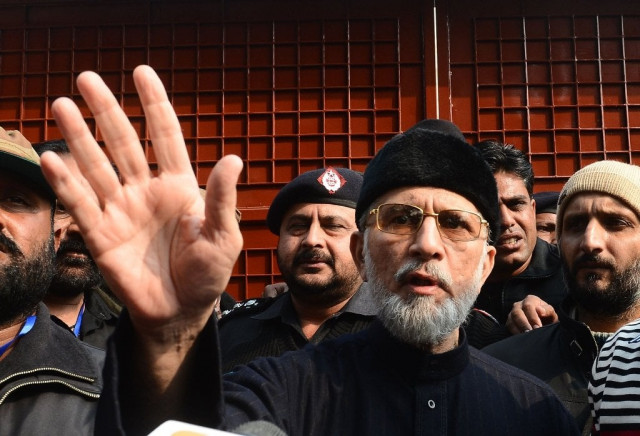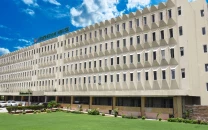Analysis: Why Qadri must renounce Canadian citizenship
The Canadian authorities can revoke his refugee status as he has voluntarily come back to Pakistan.

Given Allama Sahib’s background, it can be safely assumed that his asylum claim was based either on political opinion or religion or both. PHOTO: AFP
Dr Tahirul Qadri sought asylum in 2008 in Canada. The gist of the asylum claim, according to this newspaper, was based on alleged threats to his life from groups such as the Tehreek-e-Taliban Pakistan, Lashkar-e-Jhangvi (LeJ) and Sipah-e-Sahaba. The presence of Allama Sahib in Pakistan raises two issues: legal and moral.
Legal: Under the UN Refugee Convention Relating to the Status of Refugees 1951 and the Immigration and Refugee Protection Act 2001 of Canada, individuals may claim asylum if they fear persecution based on race, religion, nationality, political opinion or belonging to a particular social group. Given Allama Sahib’s background, it can be safely assumed that his asylum claim was based either on political opinion or religion or both.
For a successful asylum claim, the fear of persecution must be ‘well-founded’. Allama Sahib’s claim was found well-founded and asylum was granted. International protection (seeking asylum in another country) is temporary in nature and ceases when the circumstances giving rise to asylum cease to exist. The presence of Allama Sahib in Pakistan and his ability to compel the government to sign an agreement, mainly on his terms, demonstrate two things.

First, that he can continue his political career without fear of persecution and second, the government can provide protection to him as and when needed. In such a situation, international protection (in the form of refugee status leading to Canadian citizenship) is no longer justified. The 951 Refugee Convention states: ‘This Convention shall cease to apply to any person … [who] has voluntarily re-availed himself of the protection of the country of his nationality [i.e. Pakistan]’. The Canadian authorities can revoke his refugee status as he has voluntarily come back to Pakistan. Or Allama Sahib can renounce his status himself.
Moral: This brings us to the moral implications of the case. As Allama Sahib is no doubt a pious person and is espousing pious and upright political leadership, the option of giving up international protection (Canadian citizenship) would be most appropriate. If he continues to avail Canadian protection simultaneously with his heavy political engagement in Pakistan, and the fact that all those organisations, although proscribed, exist and are very active, ie, the threat is out there, it will raise doubts about the genuineness of his asylum claim in Canada. And also, both positions – refugee status in Canada and his choice to become politically active in Pakistan, a country which he left because of persecution - do not fit within the confines of refugee law.
The author is a senior lecturer in law at the University of Hull, UK.
Published in The Express Tribune, January 19th, 2013.



















COMMENTS
Comments are moderated and generally will be posted if they are on-topic and not abusive.
For more information, please see our Comments FAQ